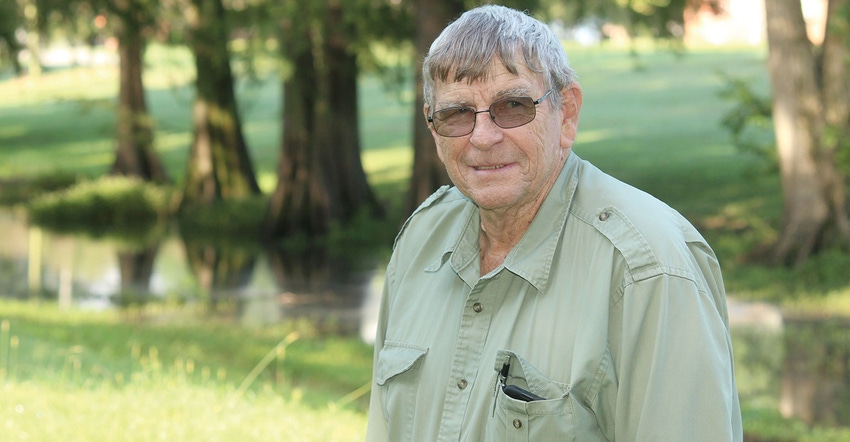
With the “self-proclaimed” stupid idea he needed a college education, little money in his pocket and the clothes on his back, Charles Denver left Benton County, Ark., in 1961 heading for Fayetteville with the ambition to attend the University of Arkansas.
During his freshman year, the University of Arkansas Department of Entomology posted job openings for summer cotton scouts that paid $200 a month. “That was the time when grown men were doing well if they made $6 a day,” remembers the UA alumnus who earned a BS in Agronomy in 1966, and a Master’s in Entomology in 1970. “I didn’t know the difference between a cotton boll and a cocklebur, but I was darn happy to be making that kind of money!”
His first assignment was scouting cotton fields on the outskirts of Morrilton, Ark., in the Arkansas River Valley, but when he arrived, there was not enough cotton to keep him and the man training him busy, so the Extension service offered him a $25 raise if he would relocate to Dumas. “I thought about it for two seconds and I’ve been there ever since,” says Denver. “I was just trying to make enough money to get through school!”
Being a Consultant Back in the Day
After four years of scouting cotton, he became obsessed with the commodity and wanted to learn everything he could about how it reacted to inputs and the environment. He accepted a full-time position with R.A. Pickens and was placed in charge of all aspects of crop advisement.
“There was very little corn in that area at the time, but there was plenty of cotton, rice, soybeans and even a little wheat,” recalls Denver. “We were using aerial application, and planes like the Stearman, the Pawnee, and the Piper PA-25 would spray liquids and powders or, as we called them, dust – hence the term ‘crop duster’.”
The last time he saw anyone hand picking cotton on Pickens Plantation was 1962. Tractors were making their first appearances, but farm managers were skeptical of the machines. “They kept the first ones in the shed until they realized how valuable and efficient they could make the operation,” remembers Denver.
“The first two-row cotton picker also made a big impact. Until then, a “picking device” was attached on the back of a tractor that was driven backwards,” laughs Denver.
During his early years of consulting, growers would sometimes dispute his recommendations. He had client farmers who would say, “I can’t afford to do that.” His advice was always the same, “You can’t set yourself up to fail by not correctly managing your crop.” “I had several farmers that farmed ‘from their pocketbook’, and just like scouting from the windshield, that’s never smart.”
Early in his career, Denver was consulting on over 21,000 acres for farmers in the South. He had one field that stretched over the Arkansas/Louisiana state line. He soon realized his recommendations were illegal in Louisiana, so he applied for his license in the Bayou State. “Louisiana used to be tough on enforcing consultants to have a license,” says Denver. “One guy offering crop recommendations didn’t have a license and was fined quickly.”
Denver remembers when pigweed made its arrival to his part of the state. There were products that controlled it for a while but then resistance developed. “The problem with pigweed is that there are multiple species, and those species will cross-pollinate via pollen traveling in the wind,” says Denver. “You can have a 100 percent susceptible population today, and if one plant that goes to seed gets pollinated by a resistant plant, the population will explode the next season.”
Looking Back…and Ahead
Now 75 years old, Denver is starting to slow down a bit. He was the Arkansas Consultant of the Year decades ago. He’s got a plaque somewhere among the many awards, trophies, and stacks of paper around his office. He has been recognized by the Crop Protection Association, the Soil Fertility Association, and is the current president of the Desha County Farm Bureau.
Denver speaks highly of other consultants he has known throughout his career. From Ray Young and Roger Carter, to Arkansas’ Dwight Lincoln, Denver has many other consultant friends he still speaks with on a regular basis. “I trained one young man who’s working around El Campo, Texas, that stays in touch,” adds Denver. “I must be crazy from too many days in hot cotton fields, but work keeps me going.”
He picked up a part-time job as a crop insurance adjuster that occupies around 20 hours of his time each week. When asked what advice he would give to someone who wanted to become a consultant, Denver was quick with his advice. “Take all the classes you can dealing with plants, entomology, and business,” he advises. “Every college graduate should have a good working knowledge of business — one shortcoming I see in a lot of people.”
He still receives a request to speak to groups every now and then, and admits he is like Woodrow Wilson: “If I am to speak for 10 minutes, I need a week for preparation; if an hour, I’m ready now.”
About the Author(s)
You May Also Like




